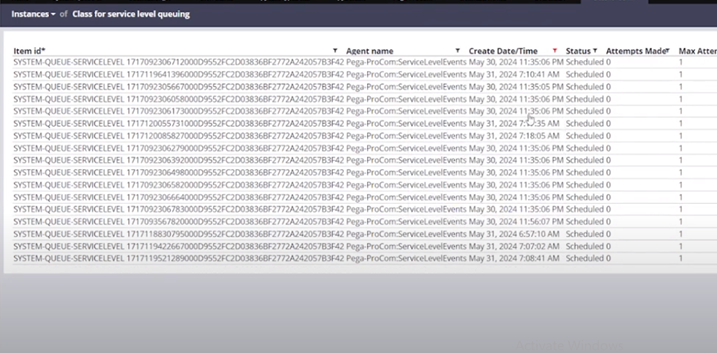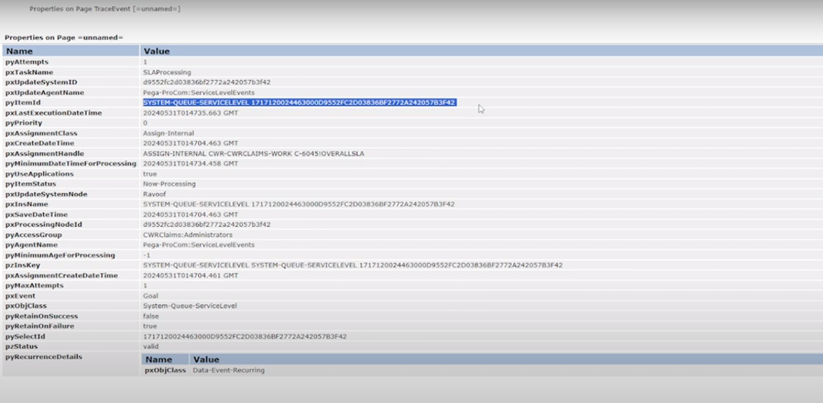Question
Cognizant
IN
Last activity: 11 Jun 2024 2:45 EDT
in a SLA a deadline is executed before the deadline time how to debug SLA in this case
in a SLA a deadline is executed before the deadline time is reached how to debug SLA in this case
-
Reply
-
Share this page Facebook Twitter LinkedIn Email Copying... Copied!
Accepted Solution
Updated: 11 Jun 2024 2:45 EDT
HCL Tech Limited
IN
As I mentioned, if the queue items are present in the pr_sys_queues table (with scheduled status), then the agent will pick them for processing.
The ServiceLevelEvents agent is a standard agent that runs every 30 seconds. Based on pyItemId and pxcreateDateTime you can able to know the transaction's SLA. Based on it, you come to know the transaction's SLA tracer events.
I have attached the screenshot for your reference (FYR).


Thanks,
Ravoof.
Pegasystems Inc.
CA
Please find th below steps
Admin Studio - Queue Processor - > pyProcessSLA -> Trace (attached screenshot for your reference)
Updated: 7 Jun 2024 4:53 EDT
Cognizant
IN
@RameshSangili Queue processor for tracing SLA ?
and also we have an agent named ServiceLevelEvents for sla so we cant trace that?
Updated: 7 Jun 2024 1:54 EDT
HCL Tech Limited
IN
Hi @TanyaS58,
- During a case creation, DefineSLATimes (Sets the values for pxGoalTime and pxDeadline) OOTB activity invokes Assign-AddAssign (saves a new assignment) to make queue entry in System-Queue-Service-Level for overall SLA event.
- At run time, an agent and the Work-.OverallSLA flow monitor the service-level agreement, and the Case Details section on a case displays how much time remains to meet the goal or deadline.
- Now, we have a queue. This queue will be picked by Agent ServiceLevelEvents standard agent which increases/decreases the urgency and executes the escalation action if any.
In order to trace, we have an agent dedicated for SLA:
- ServiceLevelEvents
If your environment version is 23/24.1 or later, you can trace these events using the OOTB queue processor pyProcessSLA.
Note: By default, pyProcessSLA is not set to ON. You need to enable it manually if you want to queue the items with the queue processor instead of agents (as agents are deprecated).
How to enable pyProcessSLA:
We have a dedicated DSS: useSLAQueueProcessor that needs to be set to true.
I have attached a screenshot for your reference (FYR).
Hope this clarifies.
Hi @TanyaS58,
- During a case creation, DefineSLATimes (Sets the values for pxGoalTime and pxDeadline) OOTB activity invokes Assign-AddAssign (saves a new assignment) to make queue entry in System-Queue-Service-Level for overall SLA event.
- At run time, an agent and the Work-.OverallSLA flow monitor the service-level agreement, and the Case Details section on a case displays how much time remains to meet the goal or deadline.
- Now, we have a queue. This queue will be picked by Agent ServiceLevelEvents standard agent which increases/decreases the urgency and executes the escalation action if any.
In order to trace, we have an agent dedicated for SLA:
- ServiceLevelEvents
If your environment version is 23/24.1 or later, you can trace these events using the OOTB queue processor pyProcessSLA.
Note: By default, pyProcessSLA is not set to ON. You need to enable it manually if you want to queue the items with the queue processor instead of agents (as agents are deprecated).
How to enable pyProcessSLA:
We have a dedicated DSS: useSLAQueueProcessor that needs to be set to true.
I have attached a screenshot for your reference (FYR).
Hope this clarifies.
Regards,
Ravoof.
Cognizant
IN
@Mohammad Ravoof i am using pega version 8.7
HCL Tech Limited
IN
So, pyProcessSLA won't be available for 8.7 version (just to avoid confusion, pega has removed this QP). You must use agent ServiceLevelEvents to trace.
Thanks,
Ravoof.
Cognizant
IN
@Mohammad Ravoof 1 small thing i want to add up like ServicelevelEvents is just an agent right so how will it now which SLA i want to trace?
Accepted Solution
Updated: 11 Jun 2024 2:45 EDT
HCL Tech Limited
IN
As I mentioned, if the queue items are present in the pr_sys_queues table (with scheduled status), then the agent will pick them for processing.
The ServiceLevelEvents agent is a standard agent that runs every 30 seconds. Based on pyItemId and pxcreateDateTime you can able to know the transaction's SLA. Based on it, you come to know the transaction's SLA tracer events.
I have attached the screenshot for your reference (FYR).


Thanks,
Ravoof.
